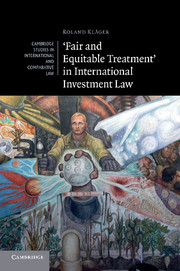Book contents
- Frontmatter
- Contents
- Foreword
- Acknowledgements
- Table of cases
- Table of treaties
- List of abbreviations
- 1 Introduction
- Part I The construction of fair and equitable treatment
- Part II The concept of fair and equitable treatment
- Part III The position of fair and equitable treatment in the international legal system
- 10 Conclusion
- Bibliography
- Index
- misc-endmatter
Foreword
Published online by Cambridge University Press: 05 July 2011
- Frontmatter
- Contents
- Foreword
- Acknowledgements
- Table of cases
- Table of treaties
- List of abbreviations
- 1 Introduction
- Part I The construction of fair and equitable treatment
- Part II The concept of fair and equitable treatment
- Part III The position of fair and equitable treatment in the international legal system
- 10 Conclusion
- Bibliography
- Index
- misc-endmatter
Summary
International investment law has grown considerably in importance in recent years, as evidenced by the great increase in the number of international investment agreements, in the scholarly literature and even in the number of awards. Nevertheless, the doctrinal foundations of international investment law have remained highly contested: it is easier to draw up a list of disputed than agreed propositions. Dr Kläger's work seeks to address this problem in respect of fair and equitable treatment, a central norm of international investment law. In doing so he discusses fair and equitable treatment in relation to general theories of international law, legal method and even international justice.
In Part I he argues that exploring these doctrinal foundations gives a broader justificatory basis to the fair and equitable treatment standard and thereby conduces to greater consistency and legal certainty. This contrasts with a persistent trend of opinion that fair and equitable treatment is irreducibly vague, and that it authorises international tribunals to conduct an ‘all things considered’ examination of host State action or inaction. On this view, arguments derived from the general rules of interpretation are of little use in the application of fair and equitable treatment: the only important question is what the current tribunal decides happened and whether it was – at some adjectival level – unfair or inequitable to the investor.
- Type
- Chapter
- Information
- 'Fair and Equitable Treatment' in International Investment Law , pp. xiii - xivPublisher: Cambridge University PressPrint publication year: 2011

